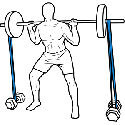Whey is a dairy protein that is a by-product of the cheese making process. In its raw state, whey contains substantial amounts of fat and lactose (milk sugar). You wouldn’t want to eat raw whey. That’s why it is filtered and processed: to remove most of the lactose and fat. The end result is a more concentrated protein – either concentrate or isolate (which is what you want).

The primary difference between isolate and concentrate is that the isolate is more pure. In other words, isolate contains more protein with less fat and lactose per serving.
If you are lactose intolerant and you have problems with gas and bloating, then the isolate might be a better choice. But being more "pure" doesn’t necessarily mean that whey isolate is better or will produce greater muscle growth. Whey protein concentrate is still an excellent source of protein. Besides, isolate does have disadvantages: For one, it is more expensive than concentrate. Isolate has also had some of the valuable immune-boosting protein removed in the filtering process.
In the long run, I don’t think it makes much difference whether you use concentrate or isolate, and choosing your protein isn’t something you should lose sleep over.
For practical muscle-building purposes, the important thing is to consume between 1 – 1.5 grams protein x your ideal body weight daily. Whether it comes from whey isolate, whey concentrate, soy, egg whites, chicken, fish, lean red meat or whatever – I just don’t think it matters that much.
The main benefit of protein powders and meal replacements is convenience. Drinking your protein is definitely easier than preparing, cooking and eating it. Still, 80% of my protein comes from food sources such as egg whites, chicken, lean red meat, dairy, and occasionally some tuna, salmon or other fish.
Whey protein has an array of properties that are beneficial, the main aim of course is to increase muscle mass in the body. Other important benefits include the anti-aging ability and facilitation of mind activity. Whey proteins also help reduce blood pressure and improve general performance.
The good thing about whey is that it helps the body increase its production of glutathione which is good immunity booster. It is also the most important antioxidant in the body.
POST WORKOUT MEALS FOR OPTIMAL GROWTH
When you are in the gym, lifting weights or performing resistance training, you are breaking down muscle fibers and depleting your muscle's glycogen stores to use as energy. When you step off the weight floor your body is in what's known as a catabolic state, which means that because of all the stress you have just put on it, you have hormones circulating that are counterproductive to muscle growth. You need to switch your body into an anabolic state, where you have replaced muscle glycogen stores and given your body the right amount of calories and nutrients to help your muscles repair.
• 30 - 50 grams of a lean complete protein like whey, soy, egg, chicken or fish
• 30 - 50 grams of carbohydrates with a high glycemic index
Choosing a post workout protein shake after you workout is probably the one time of the day where this is optimal. Whole foods should be consumed throughout the day to provide your body with slow digesting energy and protein, however because protein shakes in the form of whey protein are absorbed so quickly, they are the best option after you workout.
The sooner you do consume a shake with around 35 grams of protein, the better — within 45 minutes after your training session is recommended. A whey protein shake is the best post-workout protein choice because it is so readily absorbed, and it has the highest efficiency ratio, or availability to the body, of all proteins.
Why carbs with a high glycemic index? Immediately following your workout is the only time to eat carbs that rapidly absorb into the blood stream as the glucose causes an insulin spike. Insulin helps shuttle protein into the muscles, efficiently repairing and building new muscle.
Big thanks to Robert Mauthe for his generous contribution on this article. See more of his groovy work at www.robertmauthe.com.



